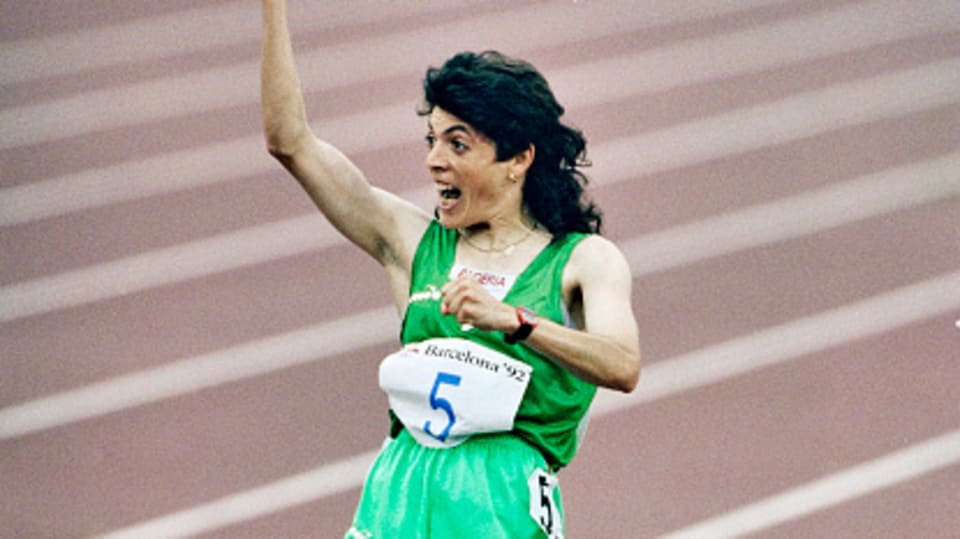Hassiba Boulmerka: The trailblazing Algerian star who defied death threats to win Olympic gold
The former Algerian middle-distance runner won her country’s first-ever Olympic gold medal. She navigated a deadly and divisive political crisis within her nation to emerge as “a symbol of victory and defiance”.

Hassiba Boulmerka and her family received death threats, and she was even denounced as anti-Islam at her local mosque.
However, in her home country of Algeria, there was no safe space for her to run.
The world 1500m world champion feared that radical Islamist militants would kill her, and the surrounding atmosphere was equally terrifying.
But despite the risks, the 'Constantine Gazelle' continued to train, running even faster and defying the threats to her life.
A year after clinching the first of her two world titles, she made history at the Barcelona Olympics in 1992, winning the first Olympic gold for Algeria.
Hassiba Boulmerka: Africa's first world track champion
Running had been Boulmerka’s way of life since the age of 10.
Growing up in Constantine, in the east of Algeria, she gained recognition for her speed and stamina, which led her to claim four African gold medals in the 800m and 1500m.
Two years after her double triumph at the continental championships, she stunned the field, sprinting to the lead in the homestretch of the 1500m race to clinch the gold.
It was a glorious moment for Boulmerka, as she became the first African woman to earn a World Championships title.
"I screamed for joy and for shock, and for much more," she said. "I was screaming for Algeria's pride and Algeria's history, and still more."
Her triumph was significant, symbolising progress for Algerian sport and Arab women.
Despite the heroic reception that awaited her and her teammates upon their return from the 1991 World Championships, her running didn’t quite resonate with everyone.
Her sporting endeavours continued to be frowned upon.
Training and competing meant exposing her arms and legs, which was perceived as not adhering to Islam’s code of modesty.
Hassiba Boulmerka was spat on and had to dodge stones thrown at her while training on Algerian roads.
Hassiba Boulmerka was labelled 'anti-Muslim' for choosing to run
Boulmerka pressed ahead, enduring the criticism.
She faced hostility, being spat on and having to dodge stones thrown at her while training on Algerian roads.
In a matter of months, her hopes and dreams of participating in the Olympics started to fade as her country was plunged into civil unrest, resulting in over 150,000 lives lost.
Training became not only impossible but also dangerous during the crisis, with Islamist militants seeking to impose oppressive rule.
She was forced to relocate to Berlin to train ahead of the 1992 Olympic Games.
"I remember it well," she recalled in an interview with the BBC. "It was Friday prayers at our local mosque, and the imam said that I was not a Muslim, because I had run in shorts, shown my arms and my legs. He said I was anti-Muslim."
When she arrived in Barcelona just before her event, Boulmerka was accompanied by armed escorts into the stadium, highlighting the unprecedented security measures.
"There were police everywhere. In the stadium, in the changing rooms - they even came with me to the bathroom!" she said.
Despite these challenges, the ‘Constantine Gazelle’, as she was affectionately dubbed for her agile and graceful running style, defied the odds and her performance at the Estádio Olímpico was remarkable.
Hassiba Boulmerka: A heroine for women in sport
The Unified Team’s Lyudmila Rogacheva set the pace for most of the 1500m race before the Algerian powered past her with half a lap to go, securing her greatest career victory. Her time of three minutes, 55.30 seconds earned her the Olympic gold medal, marking the second time second time an Arab woman had stood atop the Games podium (after Morocco's Nawal El-Moutawakel at Los Angeles 1984).
It was a beautiful ending after months of navigating political challenges - an example of ‘courage in defying taboos and pursuing passion’.
"As I crossed the line, I thrust a fist into the air. It was a symbol of victory, of defiance. It was to say: 'I did it! I won! And now, if you kill me, it'll be too late. I've made history!'"
As Boulmerka stood on the podium, feeling the weight of the medal around her neck, she was overwhelmed by emotions.
"I tried to hold myself together, to be brave…but the tears just started to fall. They were tears of sacrifice, for all the people I loved that I had abandoned for this race.
"It was a triumph for women all over the world to stand up to their enemies. That's what made me really proud."
There was no fanfare when the two-time Olympian returned home to reunite with her family.
Algeria was still far away from the end of its dark period, prompting he exile in Cuba before she returned to Algeria after recapturing the gold medal at the 1995 World Championships.
Her medals stand as a testament to her courage, and Hassiba Boulmerka continues to serve as a beacon of inspiration for women in sport.
Hassiba Boulmerka celebrates her first world title in Tokyo, Japan.
